In Kenya, springing to action as schools partially reopen
When Kenya closed schools nationwide in March 2020 to help curb the spread of the novel coronavirus, we worked carefully to ensure all school rain tanks and latrines already underway reached completion despite the closure. To achieve this, we relied on a combination of mutual trust and communication with the schools and students’ families to finish construction while keeping our team and the communities safe.
Kenyan schools were initially scheduled to reopen in January 2021, when we planned to train students and teachers on COVID-19 prevention, handwashing, and how to take care of their new rain tanks and latrines.
However, recently, the Kenyan government allowed specific grades of students to resume their classes for the remainder of 2020. Upon hearing this news, we treated the water in every school rain tank to ensure a fresh supply of drinking water for the returning pupils.
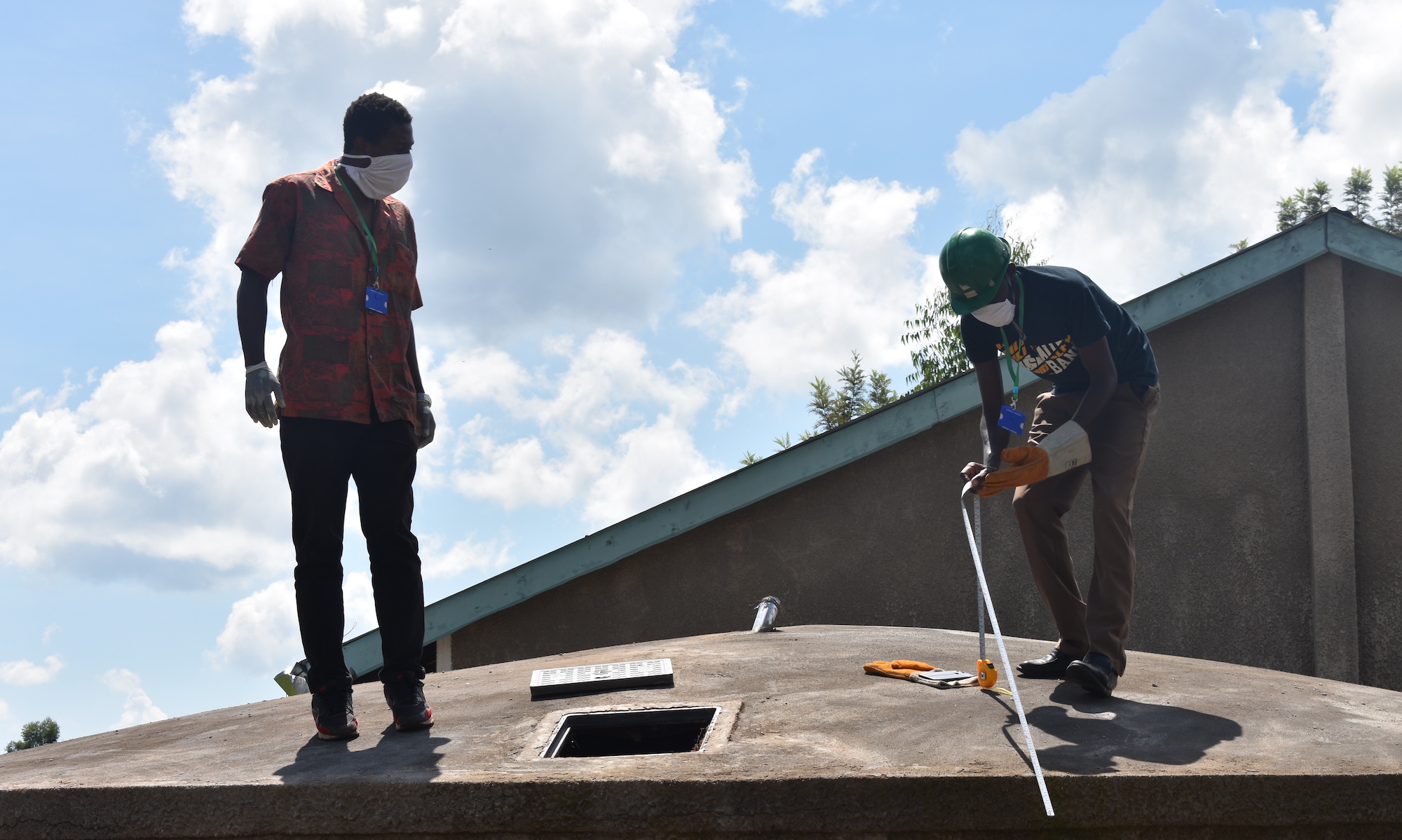
An Operations and Maintenance team stands on top of a school rain tank to measure the water levels through the removable cover to calculate the amount of treatment required.
Our three teams in Western Kenya banded together to treat 272 rain tanks within just three weeks. Their teamwork and efficiency enabled every school we serve to open to their students with confidence in their access to safe and clean water.
Once students returned to school, we acted quickly to offer our health, hygiene, and COVID-19 training to schools to use clean water from their rain tanks to keep students and teachers safe and healthy. Our good relationship and open communication with schools led to some principals inviting our teams to conduct the training immediately. Other schools are still determining the best time for the training, depending on their students’ immediate academic needs and their communities’ risk level.
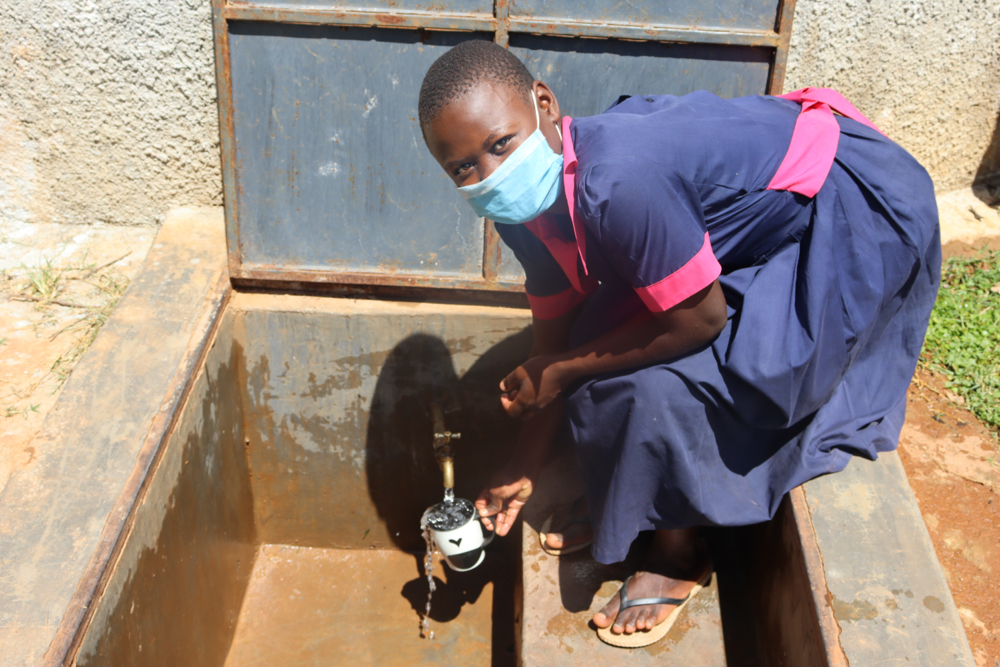
Pupil Gloria gets a fresh drink of water from the rain tank to celebrate the project’s official handing-over to her school.
When time allows (there are currently strict timetables for school visitors to minimize possible exposure), we are also officially handing over the schools’ rain tanks and latrines. Though limited in scope, these have been particularly joyous celebrations as we had not expected this would be possible until some time next year.
School in a time of coronavirus
Meeting students back in school during the pandemic looks quite different than when we last saw them in March.
“We have set out posters about measures of COVID-19 prevention all over the school,” said Gloria, a pupil at Jinjini Friends Primary School. “We have a handwashing station set at the gate with soap. We ensure everyone passing at the gate has their temperature tested, and we wear masks,” she said as she ticked through the changes at her school since she returned.
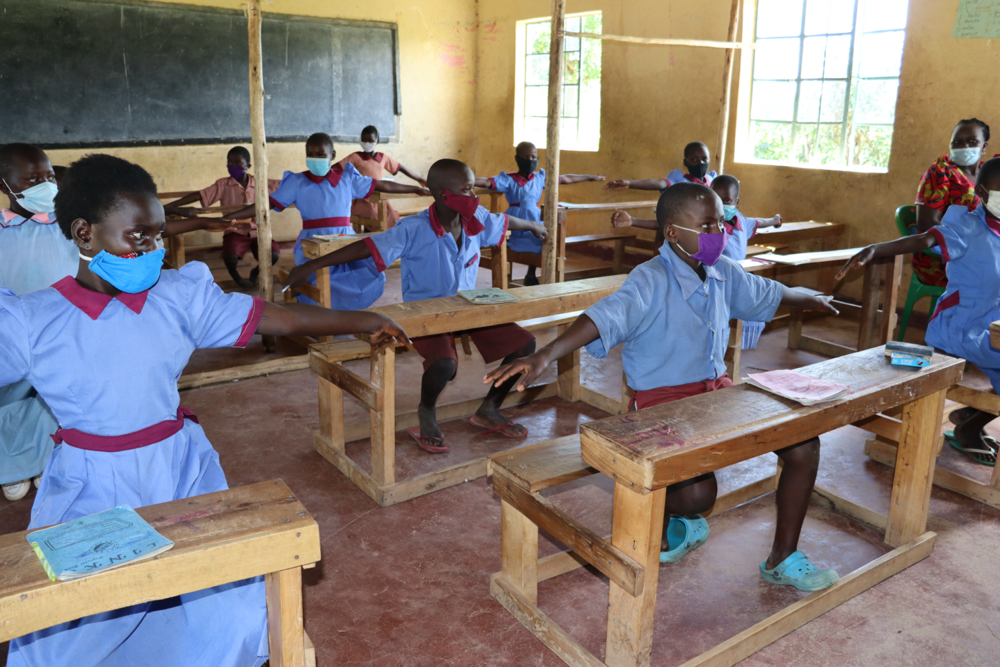
Pupils do a quick arm stretch to check their physical distancing while seated at the training.
Physical distancing and mask-wearing are requirements for anyone on school grounds and frequent handwashing with soap and clean water. There are very few students allowed back compared to the total number of pupils who are eagerly awaiting their turn to study come January.
But many things have stayed the same.
The importance of handwashing remains one of the top preventative measures to keep diarrheal diseases – and the novel coronavirus – at bay. The need for clean water is still essential in improving the schools’ hygiene and sanitation levels. And above all, our teams continue their endless efforts to help prepare these students for healthier lives in which they can reach their full potential without having to worry about where they will get their next clean drink of water.
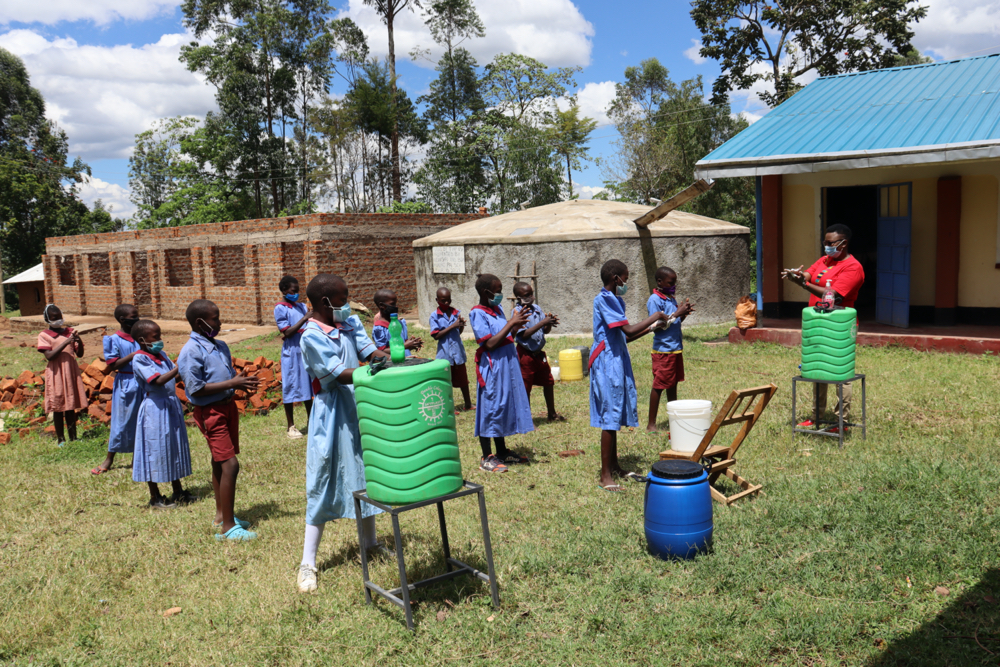
Trainer Jacklyne Chelagat leads a handwashing session.
Training
We are focusing on COVID-19 prevention, transmission, and symptoms while also covering a number of other topics at each school training. Lavendar, a pupil at Mukoko Baptist Primary School, described the training as “very informative. I have learned a lot. I now know the difference between the coronavirus and COVID-19. I am so grateful.”
Emmanuel, a classmate of Lavendar’s, said, “we were taught a lot of things. I have been taught how to wash hands, new ways of greeting other people, and how to prevent myself from contracting COVID-19.”
“We were washing hands, but not in the right way. We were also observing social distancing, although we were not very keen. Today, a lot of emphasis has been placed on all safety measures. We intend to observe all preventive measures just like we did before, but this [time] we shall be keener and more strict.”
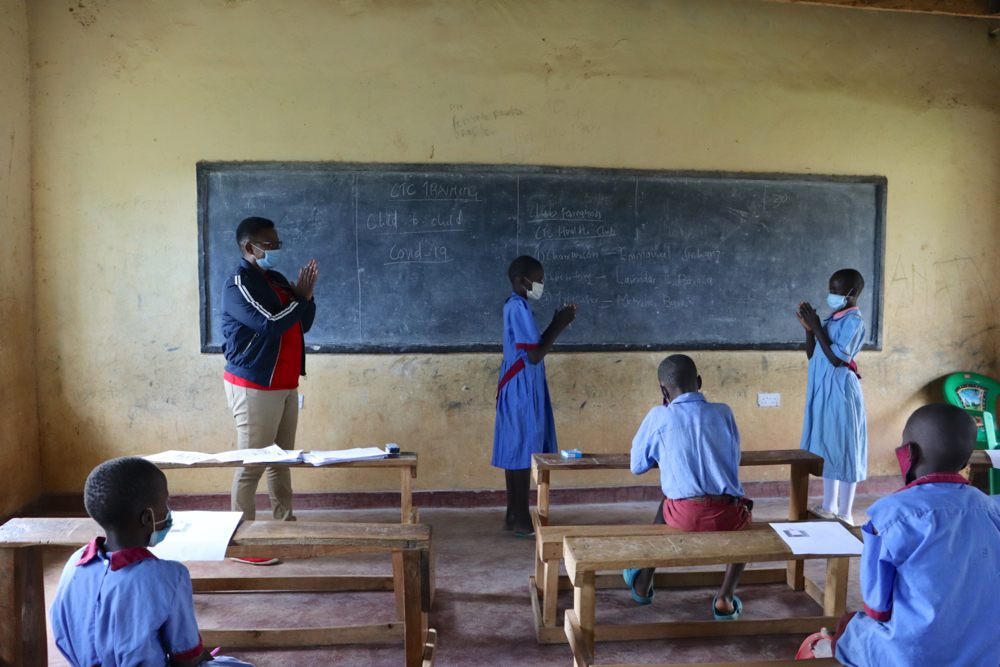
Students practice new contactless greetings in place of the typical handshake, fist bump, or hug.
“I now know how to wash my hands properly. I was excited to learn the ten handwashing steps,” said pupil Clyson from Jinjini Friends Primary School.
The facilitators discuss other topics such as personal hygiene, bathing, oral hygiene, the ten steps of handwashing, environmental hygiene, child rights; operation and maintenance of the rain tank, latrines, and handwashing stations; and leadership and governance.
During the governance session, the students elect their peers to lead their newly formed student health club. The club will be significantly involved in the water, sanitation, and hygiene project management at their school. They will also be responsible for encouraging good health and hygiene practices amongst their peers, teachers, and the broader community.
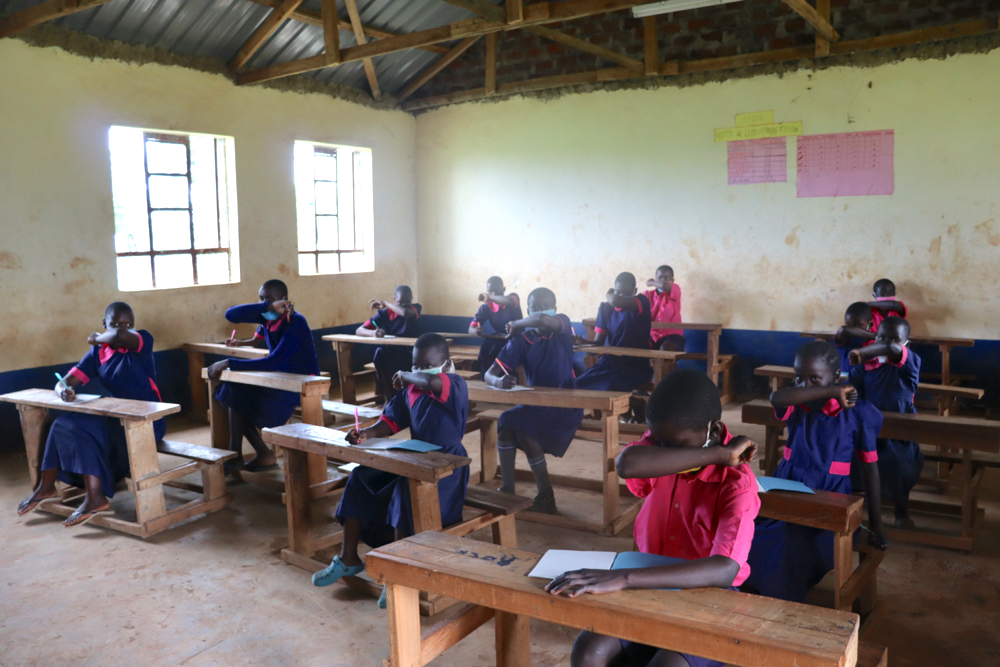
Students practice coughing and sneezing using the elbow.
When more students return to school next year, the students we trained will be instrumental in sharing what they learned with the rest of the student body to help keep everyone safe and healthy. When schools fully reopen, we will continue to engage them in coronavirus prevention training and reminders.
“We will continue to insist on the measures of prevention to prevent the spread of the virus,” Gloria added with determination.
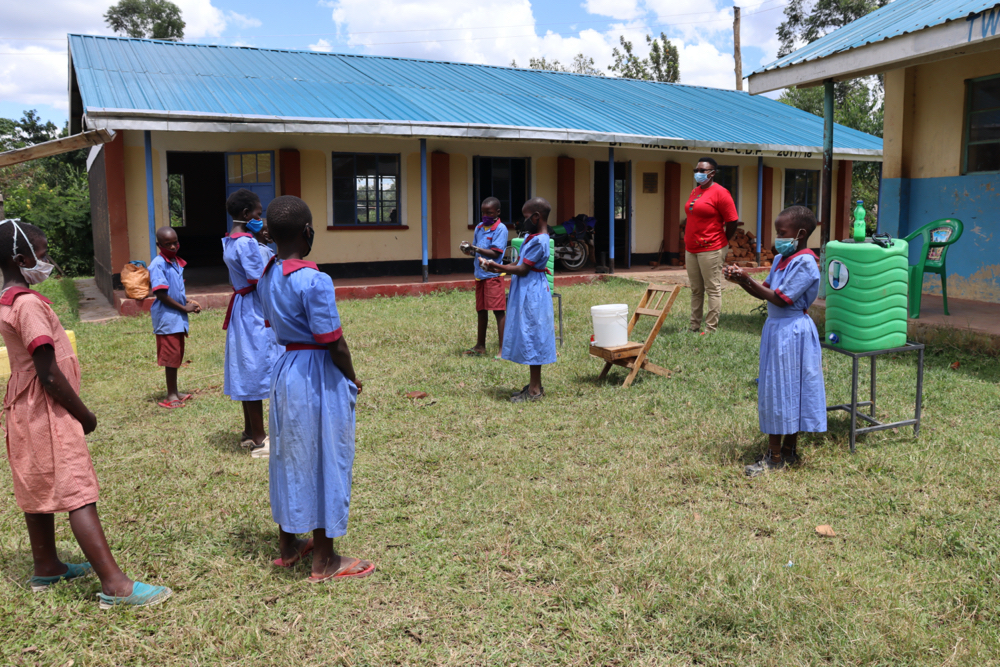
Students lead their classmates in a handwashing demonstration.
Tweet